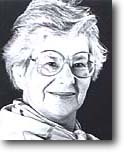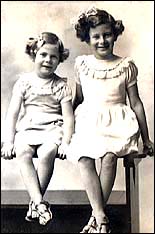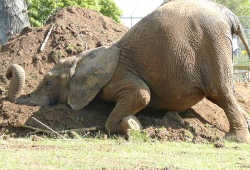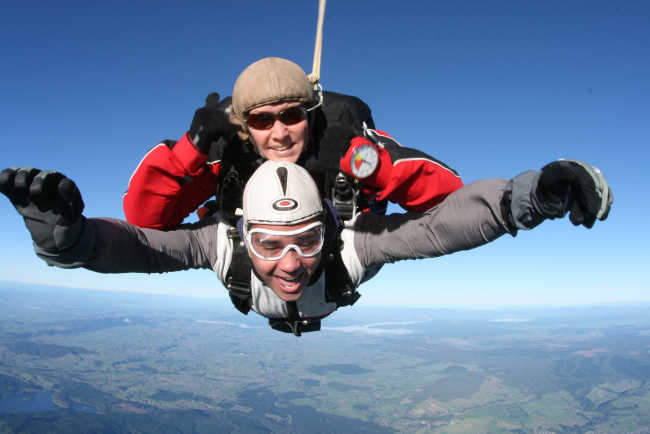Part 7 – Home Schooling And Freedom On The Home Farm Foster Abilities An interview with Jackie Steincamp, Dorothy – 15/12/00
You can read the previous parts in the Growing up in New Zealand 1920 – 1950 series here, or read the articles from the original Growing Up in New Zealand series.
What sort of school will suit my child? Parents agonise over choosing a school for their children. What style of education will best develop their talents? What is going to fit them best for their later life and their career? Shall we try home schooling?
|
|
| Jackie Steincamp Photo source Jackie Steincamp |
Jackie Steincamp looks back on a childhood where her mother educated her two daughters at home and her imagination ran wild unfettered by the restrictions of life in town.
“As a child I lived in South Canterbury on a back country farm in the thirties with no electricity, mail deliveries three times a week, an overloaded phone on a party line, and no radio or TV. It was during the Depression and that meant that there were always people in the house. The young women we knew who couldn’t find jobs often helped in the house; and personable young men gave a hand on the farm.”
Education at home Days were never dull for Jackie and her sister Judy. The mornings were spent on lessons – reading, writing, arithmetic, history, geography – and so on – taught by their mother whom Jackie describes as ‘amazing’.
Sharing in the work in the home, farm and garden The girls also helped their parents without question… well, nearly without question. Judy hated drying the dishes, and Jackie hated cleaning the many pairs of her parents’ shoes, a job which was allocated to her alone.
They both helped in yarding the sheep, sweeping out the woolshed during shearing (Judy became a proficient shearer), taking morning and afternoon tea to the shearers, and helping drive mobs. When lambing time came, they took responsibility for the motherless and feeble lambs. They fed the chooks and collected the eggs.
They mowed the lawns, cut the edges and weeded in both the flower and kitchen gardens. They scrounged for pine cones for the fires, and both became adept at chopping kindling.
Whenever there was no cowman around, Judy chose to milk the cows – that was from about age eight. Jackie thought that was a mug’s game, but was happy to separate the cream from the milk (by hand), and make butter in a wooden churn.
“We were not paid for doing our jobs. We did not expect it, and I think I would have been ashamed to have received it,” said Jackie.
Entertaining themselves “What amazes me when I look back on our childhood is the confidence that our parents, Betty and Otto Richards, had in our ability to amuse ourselves safely and the way they left us to our own devices. My younger sister, Judy, had far more confidence than I had. She did many extraordinary physical things. Aged six she would wander down the road to where the Public Works Department was putting in a bridge. She spent days driving a bulldozer though she was too small to sit on the seat and had to stand. My parents were very proud of that.”
“Ponies and horses, their care and their enjoyment, took up a great deal of time both in winter and summer. There were long, unsupervised rides across country, especially magic in summer. Then there were larks singing overhead, exquisite views of hills upon hills, with the aromatic smells of tussocks and native plants that made it all so unquestionably ‘Home’. In the winter there was skating on the rink Dad had made by the river, with skating parties at night, lit by the headlights of parked cars.
Not always model children Jackie recalls being photographed with her sister before going to a party.
|
|
| Judy and Jackie in their blue and pink crepe-de-chine party dresses Photo source Jackie Steincamp |
Their beautiful dresses came to a sad end shortly after this picture was taken. While waiting for their mother to drive them to a children’s party, the nicely dressed sisters whiled away the time by painting the neighbour’s shabby front door. The result was disaster for both door and dresses.
Making places and paths a passion for the sisters “Looking back what seems to me a highlight in our lives was making roads and places. When I was five and my sister was two we gloried in a back area of really long grass behind the house. It was never mown. It was summertime and the grass was warm and it was so long and we were so small that we actually made tunnels in it and could crawl through them. We turned the area into Nelson’s flagship, ‘Victory’. We imagined decks, a big bump was the bridge, there were cabins, places where the ammunition was kept, and gun ports all around the outside where we could fire at the French as they came up the English Channel. We spent days in the ‘Victory’ and that was our first venture at making places and paths.”
Passionate interest in reading When I asked Jackie how she was so well informed about this subject at age five she said that her mother had taught her to read phonetically at age three. She had ‘sounded’ her way through encyclopaedias, books of knowledge and all sorts of books in her mother’s wonderful library. “My mother said I basically taught myself to read.” Jackie read Arthur Mee’s Children’s Encyclopaedia from one end to the other, and felt so excited by Greek myths – and the wonderful world awaiting her.
Another place-making venture “When the nights were warm and beautiful and the moon shone it was sometimes very hard to stay asleep. We had the wonderful idea of building a town, laying it out in the deep pine needles of the pine woods which were very close to the house. We were so engrossed in it, that we carried on by the light of the moon, getting up round about 2 a.m. for a week or two.
“We made streets by piling up the pine needles, and we outlined little houses which belonged to imaginary families which we created for the town. We also had civic buildings, including a courthouse, and as our town was to be a cultural centre there was an opera house and a theatre. We made torches from dead pine branches to add to the drama and excitement. How we managed not to burn the plantation down, I’ll never know!
“Our streets were three or four feet wide so we could actually ride along them. One night we got out our ponies and I can remember cantering through the streets of our little town yelling and screaming, and all the dogs barking for miles around. There was another farm close by and their dogs joined in too. We must have made a terrible noise, and our parents never said a word. We’d stagger back to bed about 5 a.m. and sleep half the morning because we were so exhausted by our wonderful night.”
First radio a disappointment There was of course no television at that time, and with no electricity there was no radio. Her father eventually made a waterwheel down by the river to charge a car battery and ran a radio from that. Because the battery went flat very fast, the only programmes allowed were the ones he enjoyed – things like The Fourth Form at St Percy’s and Dad and Dave. Jackie was very disappointed as she had imagined that the house would be filled with all the wonderful classical music she had only read about.
Indoor entertainment In winter the family played games in front of the fire with their parents – endless games of Monopoly, Five Hundred and Old Maid, Draughts, and Pick-Up-Sticks. Consequences was also popular – bringing on serious attacks of hysteria from all concerned. “The neighbours, Prime Minister Peter Fraser, Hitler… all meeting in the most unlikely places and having the most unlikely conversations.”
Jackie would draw and paint endless dolls on cardboard, making costumes for them – much more satisfying than buying books with dolls and dresses ready to cut out. She was also intrigued with house and office designs, creating dozens of them. Sadly, her poor maths ruled out a career in architecture. But writing was another thing. She started writing at age seven or eight and kept it up throughout her childhood – a whole exercise book full of a semi-historic poem in quatrains. She also wrote part of a novel and lots of shorter poems.
“We had quite a few toys” Jackie recalled, “but the toys that we really loved came out of our minds, and this creation of spaces, of towns, of ships, was so important to us. My empty child’s mind, not filled by television or radio, was just waiting to be able to create things. I think that many children’s creativity today is utterly stifled.”
Enrolment at school at age twelve Jackie started school at age twelve with a miserable year at an English boarding school. Returning to New Zealand, she boarded at Craighead Diocesan School in Timaru. She loved the kindness and friendly atmosphere there and didn’t feel homesick. She relished the opportunities to write. At the Inter School Drama Festival Craighead entered a play about Cinderella which Jackie had written in rhyming couplets. They came second in the competition.
A questioning mind Jackie was bored by the school science courses – English botany and basic chemistry, poorly taught. She did wonder if there was a subject in which you learnt about the chemistry of living things (she hadn’t heard of biochemistry). As a small child she had read in The Timaru Herald about enzymes – amylopsin, trypsin, and antitrypsin – and asked her mother what enzymes were. She was told that they were tiny elements in your body that made everything work. Totally enthralled by the idea, she made up a song about these fascinating words and sang it as she rode around the farm.
“I remember my father telling me what sheep could or couldn’t eat, ” Jackie said. “My mother mentioned that you can give young horses beans, but if you give old horses beans, that will kill them. I remember asking whether there were some things that were better for human beings than others. The reply was that human beings can eat ANYTHING, and I remember thinking, ‘I’m sure that’s not right’.”
What special skills did the sisters develop as they grew up? Judy a sportswoman Judy Richards excelled in every sport she touched. She played hockey for Canterbury, was a member of the first New Zealand women’s cricket team, playing with them in the U.K. At the end of her first week of skiing (in Austria), she was awarded the British Ski Council’s Silver Medal for proficiency. The Council representatives were so impressed by her excellence, that they arranged a special floodlit test for her the night before she returned home. Quite extraordinary by any standard.
Jackie involved with words Jackie went on to carve out a career first as an advertising copywriter in London, winning a copywriting award; then as a feature writer for “The Listener” and a range of women’s magazines. She had her own column in “The Press” and in a number of provincial newspapers. She wrote a couple of books, including one on M.E. (Chronic Fatigue Syndrome). In later years, she focussed more on health issues, often taking approaches that were not those of the mainstream medical authorities.
She became a noted feminist, providing leadership in abortion law reform and Social Welfare policies as they affected solo mothers. She was chairperson of the committee which erected the 1993 national memorial to women’s suffrage – the Kate Sheppard Memorial in Christchurch.
Read Women’s Suffrage, or Celebrating Women’s Suffrage 106 Years On for more information.
Read more about this remarkable woman in
People Making Changes Issue 38
Jackie Steincamp has written the following articles for NZine;
Electromagnetic Radiation Out Ouruhia Way
The Damage And Reducing The Impact
Report On Ouruhia Health Concerns
A Win-Win Situation Or A Lose-Lose Affair?
Health The ‘Stealth’ Bugs
Book Review The Unforgiving Minute: A Life of Rudyard Kipling






